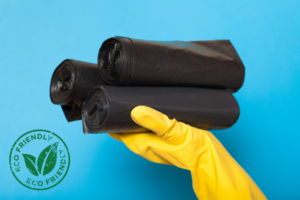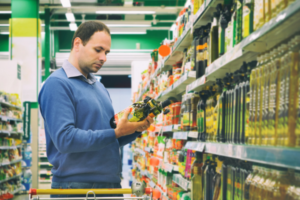
Red alert: What you should know about greenwashing
As environmental awareness increases in Australia, we want to know that our purchasing choices matter. Any business proudly proclaiming its green credentials on its packaging should be able to back those claims up. In fact, it is legally required to do so.
The Australian Competition and Consumer Commission (ACCC) has accused Clorox, the manufacturer of Glad garbage bags, of falsely claiming that some of its bags were made from 50 percent recycled ocean plastic.

“We are concerned that, by its alleged conduct, Clorox deprived consumers of the opportunity to make informed purchasing decisions and may have put other businesses making genuine environmental claims at an unfair disadvantage,” ACCC chair Gina Cass-Gottlieb said of the Federal Court action.
Clorox isn't alone in facing scrutiny from the ACCC. Last year, the regulator highlighted concerns about environmental claims from businesses it reviewed. More than half were found to be making dubious environmental claims, known as greenwashing.
So, what is greenwashing, and can we do anything about it as consumers?
What is greenwashing?
Greenwashing is a deceptive marketing tactic used by companies or organisations to appear more environmentally responsible than they actually are. Their tactics usually include:
-
- Vague claims - Terms such as eco-friendly, natural or green are used without any specific or verifiable evidence
- Selective disclosure - Companies highlight minor environmentally-friendly actions while ignoring more significant, more harmful practices
- Exaggerated benefits - Firms overstate the positive environmental impact of a product or service
- False claims - An outright lie about sustainability initiatives or certifications
- Nature imagery - visuals of nature (eg leaves, trees, etc) are used to create a false association with environmental responsibility.
What is the impact of greenwashing?
While greenwashing can occur in any sector, cosmetics, fashion, energy, and food and drink are the top offenders in Australia.
The Australian cosmetics industry is under fire for using vague or unclear environmental claims such as sustainable or eco-friendly without providing sufficient evidence to back them up. Some also misuse third-party certifications and symbols, which can confuse consumers, potentially misleading them about a product's true environmental impact.

The fast fashion industry often promotes small "sustainable" collections to seem environmentally friendly despite overall operations being highly polluting. For example, H&M was sued twice in 2022 for falsely promoting its Conscious Choice products as sustainable.
In the food and drink industry, 38 percent of those involved in organic operations are not certified, raising questions about the legitimacy of organic claims. This is unsurprising, given that food fraud is another widespread concern in Australia.
The problem with greenwashing is that it misleads well-intentioned consumers. People who want to make responsible choices are tricked into supporting companies that might not genuinely prioritise the environment. This gives irresponsible companies a competitive advantage, erodes consumer trust in sustainability claims when they are found to be false, and ultimately hinders the fundamental, systemic change we need to address the climate crisis and other environmental problems.
How greenwashing fools us
Despite the ACCC saying that “over half of companies are potentially greenwashing”, it continues to be difficult to prove. This deceptive practice continues to be challenging to pin down for several reasons:
-
- Ambiguity in terminology - There is no universally accepted definition for terms like eco-friendly, sustainable, or green. This lack of clarity allows companies to use them loosely, complicating the task of proving claims as false or misleading.
- Complex global supply chains - Global supply chains are incredibly intricate. It can be very difficult for consumers and even regulators to trace a product's entire lifecycle to verify its environmental impact.
- Evolving standards - Our understanding of sustainability is constantly evolving. What might have been deemed acceptable a few years ago could now be considered harmful. This moving target makes it harder to set and maintain firm guidelines.
- Resource-intensive investigations - Building a case against greenwashing involves gathering evidence, understanding complex technical data, and undertaking lengthy legal processes, all of which are resource-intensive and costly.
Backlash against greenwashing in Australia
The growing problem of greenwashing has triggered backlash from consumers, regulators, and environmental organisations. Clorox's Glad garbage bags, for example, faced calls for boycotts for misleading claims about bags made with recycled ocean plastic. The ACCC’s aforementioned legal action could lead to multi-million dollar penalties.
Other notable examples include MasterChef Australia and fertiliser company NeuRizer. MasterChef has been criticised for its sponsorship deals with gas companies, while NeuRizer faced scrutiny for claiming to be the country’s “first carbon-neutral producer of urea fertiliser,” despite relying on fossil fuels.
The threat of consumer backlash and regulatory scrutiny is causing some companies to take a proactive approach. Businesses are reassessing their advertising, taking down ads that could be considered greenwashing and improving practices to avoid similar missteps.
What regulations have been implemented to reduce greenwashing?
In an effort to curb greenwashing, the ACCC has released a set of guidelines for businesses making environmental and sustainability claims. These guidelines are designed to ensure that claims are not only truthful and accurate but also backed by solid evidence. Here are the key principles:
-
- Truthful and accurate claims - Businesses must ensure that all environmental claims are factual, avoiding any exaggerations or misrepresentations.
- Substantiation of claims - Any sustainability claims must be supported by credible data and sources.
- Full disclosure - Important information, including any limitations or potential negative impacts of a product or service, should be clearly communicated.
- Clarity on conditions - The specifics and context of environmental claims should be transparent to avoid consumer confusion.
- Avoidance of broad claims - Companies should refrain from making sweeping statements without adequate proof.
- Clear language - All communications should use language that is easy for consumers to understand, avoiding unnecessary jargon or technical terms.
- Accurate visuals - Marketing materials should use images, symbols, and colours that truthfully represent the product's environmental performance and not mislead consumers.
- Transparency in transition - Companies should be open about their current sustainability efforts and future goals, especially if their journey towards sustainability is ongoing.
Violations of these guidelines can lead to severe financial penalties, including fines up to $50 million, three times the profit made from misleading claims, or up to 30 percent of a company's revenue during the period the deceptive advertising was active.
How to spot greenwashing and what to do about it
Greenwashing relies on consumers taking claims at face value. To counteract this, you can adopt several strategies to ensure you are supporting genuinely sustainable practices:
-
- Look for proof - Seek specific, verifiable evidence to support environmental claims
- Check certifications - Look for products certified by reputable third-party organisations, such as Energy Star or Fairtrade, which indicate genuine sustainability efforts
- Consider overall impact - Evaluate a company’s total environmental footprint, rather than focusing solely on isolated green initiatives
- Be wary of buzzwords - Remain sceptical of terms such as eco-friendly that lack specific, measurable meaning
- Discern authentic reviews - Develop skills to differentiate between genuine and fake customer reviews

If you suspect a company is engaging in greenwashing, start by documenting misleading advertisements, packaging, or website claims. Investigate further by consulting independent reports, news articles, or consumer watchdog investigations. Engage directly with the company via customer service or social media to seek clarity on their environmental assertions.
If you remain unsatisfied with their response, submit a formal complaint through the ACCC’s website.
We expect to get what we pay for. It’s even more galling when our buying choices are influenced by our desire to do the right thing, only to find the product is no more ‘green’ than the item next to it on the shelf. If you are suspicious about the green credentials of a product you’ve brought, get in touch, and we’ll help you handle it.





